With London Fashion Week 2021 coming up, we’re marking the date with a dive into the current state of the industry and how it’s adapted in the age of the pandemic.
Studies predicted that annual fashion industry profits would plummet around 93% from 2019 to 2020. But, despite this perilous message, the industry ended strong, with a global apparel market worth of $1.5 trillion (up from around $1.4 billion in 2019).
Many brands have displayed grit, innovation, and a will to not only survive, but thrive during these uncertain times—offering an abundance of hope for 2021.
Here we take a look at how fashion brands, from high-street to haute couture, have approached their marketing activities during the pandemic while taking a peek at how London Fashion Week 2021 is adapting to going online.
The current state of the fashion industry
As millions of consumers around the world were thrust into lockdown in early 2020, clothing sales dropped. In March 2020, clothing sales declined by 34.8% in the UK alone.
Uncertain times, coupled with a sharp shift towards a new way of living, saw many people investing more in essential items as opposed to luxury goods or fashion items.
Despite some retailers seeing a significant drop in web traffic, digitally-mature brands have seen a recent uptake in activity.
Traditional fashion brands including Clarks, New Look, Arcadia Group’s iconic Topshop (taken over by ASOS), and the liquidized department store, Debenhams (bought out by online fashion retailer, BooHoo for £55 million) have suffered in the wake of COVID.
But, the likes of M&M Direct and BrandAlley have earned more engagement and sales in the current climate. This discovery highlights the importance of embracing digital in our current climate.
Another eCommerce fashion retailer that has endured the COVID age is ASOS. The brand’s online-centric business model naturally lends itself to a digitally-driven world. But, in a time where apparel sales were dropping, ASOS understood that a pivot in brand messaging was vital.
To meet the needs and spark the interest of its audience, in summer 2020, ASOS created a curated website section named ‘Staying In-In’ (a take on the UK’s favorite cockney comedian Mickey Flanagan’s iconic phrase, going ‘out-out’).
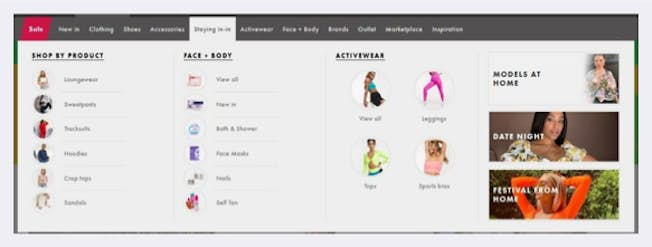
Featuring a hand-selected range of comfort wear including hoodies, sweaters, sweat pants, and loungewear, the brand inspired its consumers to invest in fashion tailored to their existing situation. This level of adaptability earned the online retailer a 19% growth in global sales in 2020.
Another brand showcasing a commitment to its consumers during the pandemic is Dutch fashion concept store, Bouclé Hommes et Femmes.
To create a brand buzz and offer its consumers a sense of excitement during lockdown, the brand offered a ‘Surprise Bag’ service. Customers were encouraged to share their measurements, tastes, and fashion preferences.
Once submitted, a Bouclé employee would create a tailored ‘Surprise Bag’ and deliver it by bike or car, returning the following day to take back any items the customer didn’t want. A forward-thinking and personal approach that earned the fashion retailer hit almost 100% of its weekly sales averages in April 2020 alone.
The last year has been challenging but it’s clear that there is great potential ‘in store’ for fashion brands that are willing to adapt their messaging, create valuable digital experiences, and meet the needs of their consumers head on.
With thousands of brick-and-mortar stores continuing to shut down in 2021—including Abercrombie & Fitch and Columbia Sportswear (among many other retail brands worldwide) the high street will take a different shape.
We are likely to see less traditional retail stores and perhaps more pop-up shops or ‘hubs’ designed for order pickups or consumer inquiries—touchpoints that tap into the omnichannel experience.
Moving & Shaking: trends, shifts, and innovations
Now that we’ve set the scene, let’s look at some of the notable fashion trends, campaigns, and initiatives that have emerged since the start of the pandemic.
1. Prioritizing Diversity
Last year, our new way of living saw the world breathe for a moment, causing many people across the globe to reconsider their values. It’s been shown that people want diversity in marketing, and they won’t settle for less.
As a result, many leading fashion brands have decided to take a long look at their internal cultures (and rightly so!) as well as their brand mission and messaging with the aim of making the industry more inclusive and diverse.
Take Gucci, for instance. Partnering up with Zebedee—a fashion agency dedicated to finding opportunities for models with disabilities—the global luxury fashion colossus demonstrated its commitment to inclusion with a dedicated editorial.
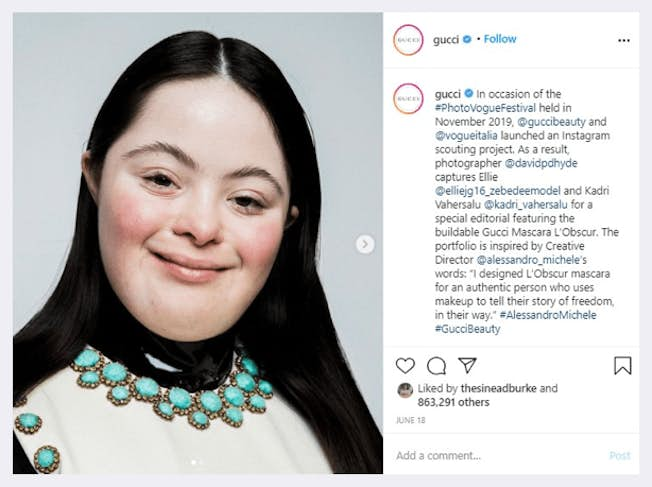
This Instagram post, featuring model Ellie Goldstein, is one of Gucci’s most-liked and best-engaged social media posts to date. A positive step in the right direction.
2. Championing Inclusion
Inclusive underwear brand, ThirdLove, also stepped up its game in the midst of the pandemic with a series of messages that celebrates inclusion, variety, and acceptance. And, it’s thriving.
ThirdLove’s earlier campaign ‘Each To Her Own’ offered a real insight into the brand’s manifesto—a commitment to celebrating all modern women—a path to which it has remained committed throughout 2020.
To demonstrate its commitment to inclusion, ThirdLove dropped many of its prices during the earlier stages of the pandemic to make its products more accessible to all women. Its initiative, ‘The TL Effect’, shone a light on female empowerment, mentorship, and diversity—recently investing in a $20,000 grant to support the emerging fashion brand, Kyutee Beauty.
“In 2021, the COVID-19 pandemic will accelerate industry trends, with shopping lifted to digital channels and consumers continuing to champion fairness and social justice.” McKinsey, the State of Fashion report
3. Using Influencers
Influencers are a pivotal part of fashion brand marketing. Since the start of the pandemic, many big-name influencers such as Bettina Looney have helped to launch clothing-centric initiatives such as an Instagram Story-based wardrobe clearout to raise money for charities including Doctors Without Borders and Help Them Help Us.
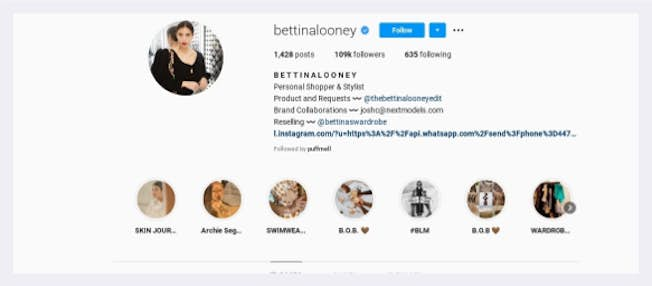
At a time when consumers have been forced in and out of lockdown, many fashion brands have started to invest in influencer marketing to create digital brand awareness.
Hashtags like #stayhome have passed the 1.5 billion mark in recent times—with some fashion brands tapping into these trends with micro-influencers that their consumers can identify with the most.
Rising social media star Christian Garcia, for example, has collaborated with a range of online-based and slightly more traditional brands including Paul Smith to spark engagement and create a buzz during the pandemic.
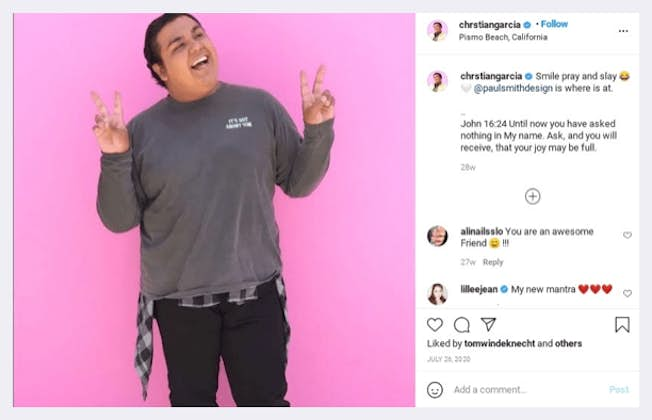
In an age where event appearance and product launch opportunities are limited, it appears that influencers need fashion brands as much as fashion brands need them—it’s a two-way street that has been highlighted by the pandemic and is likely to spearhead a wealth of interesting collaborations in 2021.
4, High-end fashion: joining the party
To remain resilient in challenging times, high-end designers including Fendi, Louis Vitton, and Stella McCartrney have joined the TikTok party to gain a share of the platform’s 100 million monthly users in the US alone.
While high-end fashion brands are typically slower to adopt emerging social media trends, it appears that the pandemic has evened the retail playing field. To adapt to a new and uncertain landscape, many luxury names are now tapping into TikTok to appeal to a younger audience and compete with some of the emerging fashion brands on the block.
Another unexpected development in the decline of luxury purchases is the potential closure of many artisan suppliers, such as Italy’s leather suppliers. Drops in revenue are having a direct impact on the livelihoods of the artisanal suppliers that create the material for luxury goods—a development that further highlights the necessity for more high-end brands to get their heads in the digital game.
Strike a pose: London Fashion Week marketing
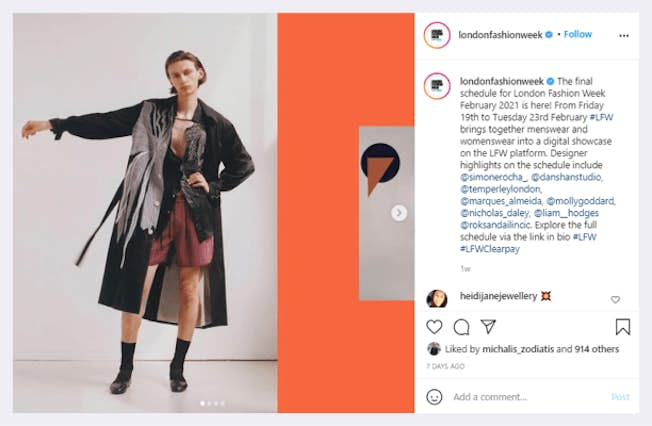
Circling back to London Fashion Week. In times that are as challenging as they were in early 2020, this year, this iconic event is taking place almost exclusively digitally.
Having signed a sponsorship deal with the ‘buy now, pay later’ financial platform, Clearpay, London Fashion Week aims to offer its audience a raft of rich online content that backs a diverse mix of designer collections and initiatives. This huge amount of content includes videos, podcasts and brand-curated playlists on Spotify.
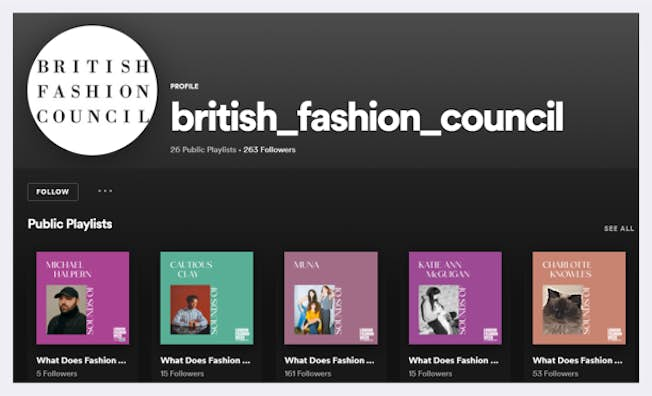
Many brands are upping their investments to back the event’s digital showcase and bring collections from an eclectic range of designers to the fashion-loving masses. House of Ikons (an official Associate to the International Art Fashion Council), for instance, is helping drive innovation at this year’s event with targeted celebrity influencer engagement and a bold series of feature films.
Speaking on the initiative, the brand’s CEO said:
Pushing diversity in every way from ethnic backgrounds, size, shape, height and age. We will continue each season highlighting beauty and creativity not just in design and music but for all regardless of colour, ethnicity, size, shape and sexual orientation; as everyone has the right to feel and look good, feel confident about who they are in the here and now.
Time will only tell how successful this year’s digital-first London Fashion Week performs. But, what we do know is that the fashion-industry is resilient.
In 2020, Milan Fashion Week went digital—coining the event as ‘phydigital (partly physical, mainly digital). A robust response to a pressing problem, although audiences clearly had to adjust to the new format, it seemed to showcase the goods.
By reevaluating and leaning on their core brand values while understanding the needs and ethics of their consumers, many fashion brands are navigating the COVID storm with class.
As the pandemic rages on, we expect to see a greater emphasis on fashion names developing meaningful digital experiences while prioritizing inclusion, diversity, and forging meaningful bonds with their audience. The best, as they say, might be yet to come.
Oh, and to get you in the mood for London Fashion Week, here’s a little gem from TikTok’s latest #frontrowfashion challenge…
“Don't be into trends. Don't make fashion own you, but you decide what you are, what you want to express by the way you dress and the way to live.” Gianni Versace
Upgrade to Power Membership to continue
your access to thousands of articles, toolkits, podcasts, lessons and much much more.
Become a Power Member- Login
- View Courses
- - - -
- Courses
- Resources
- - - -
- My Account
- Change Password
- Logout





